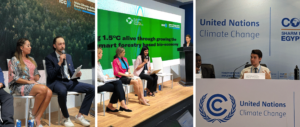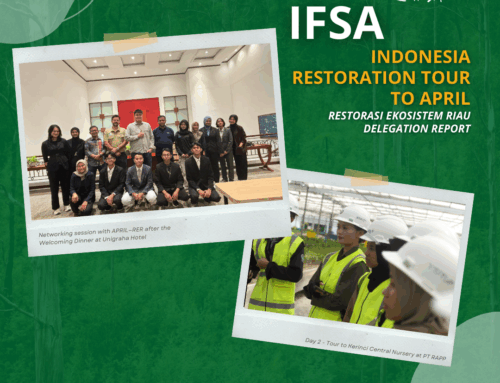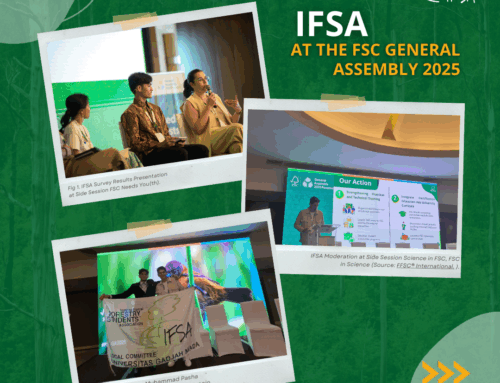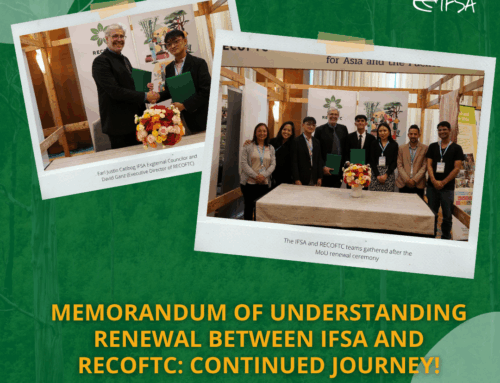UNFCCC COP 27 Egypt Experience
Background of conference
What is COP 27?
The ‘UN Framework Convention on Climate Change’ (UNFCCC) is one of the three ”Rio Conventions” which was opened for signature at the “Rio Earth Summit” in 1992. The ultimate objective of the Convention is to stabilise greenhouse gas concentrations “at a level that would prevent dangerous anthropogenic (human-induced) interference with the climate system.”
COP stands for the ‘Conference of Parties’ and is the annual UN Climate Change Conference that takes place in a different host city each year. The COP is the supreme decision-making body of the UNFCCC, and the COP assesses progress in combating climate change.
The 27th session of the COP was held at Sharm el-Sheikh Climate Change Conference (COP 27), where countries came together to take action toward achieving the world’s collective climate goals as agreed upon under the Paris Agreement and the Convention. The conference took place from 6-20 November 2022 in Sharm el-Sheikh, Egypt. The focus of the COP 27 was on Mitigation, Adaptation, and Finance.

IFSA delegates – COP 27 main entrance
Why is COP important?
Ever since the first COP in Berlin in 1995, COPs have been used to review what Parties (the countries who signed up) have achieved and measure progress. They are also where negotiations take place for the next round of emissions reductions. They are a vital means of monitoring the progress made so far and working out the targets that need to be achieved in the future if we are to reach the goals of the Paris Agreement.
The COPs are important as they bring together the governments to act on accelerating global efforts to combat the climate crisis. The current studies show that climate change is moving at a much faster rate and pushing communities and ecosystems beyond their limits. We need urgent actions to adapt to the warming environment and implement climate solutions to help people and nature.
IFSA participation / side-events
IFSA delegation overview
Through an Open Call developed by the UNFCCC SubCommission, IFSA received many applications from all over the world, which were evaluated by a selection committee, and with this, the IFSA delegation was elected. This year the IFSA delegation for COP27 was composed of 10 delegates that represented Asia (Indonesia and India), Africa (Uganda), Latin America (Chile), Europe (Germany, Switzerland and Ukraine), and North America (USA).
Among many other opportunities, IFSA representatives had a great chance to participate in 3 side events:
1. The role of certified timber plantations in keeping 1.5 alive
Organised by: The Australian Forest Products Association (AFPA) and Brazilian Tree Industry (IBA).
Summary: Planted forests make up 7% of the world’s forestry estate but produce 50% of the global industrial Roundwood supply, and this percentage is expected to increase. Plantation trees – like all trees – also store carbon.
As rotational plantation forestry is designed around using logs and replanting the trees, the overall climate mitigation benefit continues stepping up over the rotations. But planted forests have their critics who contend that they lead to decreased biodiversity outcomes and land use change. Is there a role for plantations in the global climate challenge, and if so, what do the four R’s look like? Right tree, Right place, Right scale, Right purpose.
In this panel, Agustin Rosello, The IFSA president, represented IFSA by providing the youth perspective. The three points that he talked about were the importance of changing the narrative so the forest sector isn’t looking as “evil” in some spaces, the importance of capacity development of the youth since they will be the future workforce and decision-makers, and last but not least, the importance of intergenerational and intersectoral collaboration within the forest sector.
2. Keeping 1.5°C alive through growing the climate-smart forestry-based bio-economy
Organised by: Australian Forest Products Association (AFPA) and Brazilian Tree Industry (IBA).
Summary: Half of the timber’s dry weight is carbon; therefore, forest products in all shapes and forms are the best friends climate mitigation has. To keep 1.5°C alive, we need to use more timber in construction, more forest-based fiber in packaging to replace plastics, and more sustainably sourced cellulose in a vast range of products from biofuels to clothing to car parts and even pharmaceuticals. Sustainable supply, therefore, needs to keep pace with demand.
Aditi Mishra was one of the speakers for this session held at the International Chamber of Commerce Pavillion on 14th November, 2022. She was invited as a representative from IFSA to provide a Youth perspective and share some insights on forestry education in today’s world and the role that youth can play in this sector.
3. Youth Innovation Driving Restoration with Education and Technology
Organised by: IFSA and Plant for Planet
Summary: A side event on restoration and the role of education and technology in it, focussing on how young people are driving change. Presentation on technological tools such as TreeMapper and lessons learned on restoration and the importance of its inclusion in the negotiations process.
Volodymyr Kravets, the External councilor in IFSA, represented IFSA on this panel. The main goal of the speaker was to highlight the importance of education in restoration projects. And the role of IFSA as an educational hub that uses modern technologies to make knowledge available to students all around the world. As an example, the IFSA TreE-Learning platform was observed, a platform that aims to improve skills and knowledge in global forest topics. The platform is available for all IFSA members. Check it out now!
IFSA members as speakers at different side events
Key issues discussed
Main topics of COP 27
The UNFCCC COP 27, held in Sharm El Sheikh, was the second most attended COP of all time after COP 26. This COP was presented by the Egyptian Presidency as an ‘Implementation COP’ which would focus on balanced action for tackling climate change.
This was for the first time that the parties agreed on a new fund to provide money for ‘Loss and Damage,’ funding for vulnerable countries hit hard by climate disasters. “This outcome moves us forward,” said Simon Stiell, UN Climate Change Executive Secretary. “We have determined a way forward on a decades-long conversation on funding for loss and damage – deliberating over how we address the impacts on communities whose lives and livelihoods have been ruined by the very worst impacts of climate change.”
There was some significant progress on Adaptation at COP 27, where governments agreed on moving forward with the ‘Global Goal on Adaptation’, which will conclude at COP28.
The major theme of the COP was the need to phase out fossil fuels and transition to renewable sources of energy.
New international initiatives were put forward by several countries which were aimed at stopping deforestation and restoring ecosystems at COP27. The COP 27 Cover text recognises the urgent need to limit the global temperature increase to 1.5 °C.
Outcomes for IFSA
COP 27 bring great opportunities and raise important topics to discuss. Still, the main advantage of such events is the possibility of networking, which unites people and organisations together to meet global challenges. IFSA, as the biggest forestry students’ community, has great importance in this regard since many international and regional organisations are interested in providing opportunities for young professionals, which our network can provide. In addition to this, IFSA representatives are kind in providing opportunities for our members.
IFSA representatives had the pleasure of meeting with the Australian Forest Products Association to discuss the current situation on forestry education in Australia and further ways of communicating to engage international students in this region. Many personal connections with other organisations were established and will be implemented soon, providing new speakers for IFSA events, educational materials, workshops, internships, and other valuable forms of collaboration.
Furthermore, IFSA representatives had great opportunities to meet in person with our current partner organisations. Join the side event from ITTO, who highly appreciate youth involvement in their activities. Have a discussion with CIFOR-ICRAF and RECOFTC about future plans and youth representation in scientific projects. Our future collaboration with RECOFTC is based on areas of interest related to community forestry and landscape. We have a whole week of GLF Climate with the great opportunity to know the mechanism of organisation. Join the IUCN session and discuss the possibility of reviving the HoSC IUCN in IFSA for further collaboration.
Among many other activities, IFSA was highly involved with other youth organisations – YiL, YOUNGO, and Plant for Planet. We shared sessions, opportunities, and connections. It is a great pleasure to work with people who share the same thoughts, and IFSA is looking forward to further cooperation in upcoming events.
All these connections have great importance for IFSA, making it more visible and represented on the international level. New opportunities for delegations, education, internships, and projects will appear soon. And they will help us to gain the capacity for greater representation at COP 28.
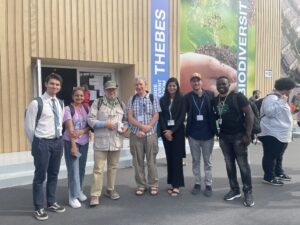
IFSA delegates with John D. Liu and Tony Renaudo
Closing remarks
Progress made since COP-26
COP 26 held in Glasgow has been framed as the “last best hope for the world to get its act together” by John Kerry, the US special presidential envoy on the climate crisis. ‘Glasgow Pact’ was one of the major outcomes of COP 26, which included a series of decisions and resolutions built on the Paris accord. The countries agreed to revisit and strengthen their 2030 emission targets and limit the warming to 1.5 degrees Celsius. Since COP 26, 24 of the 194 countries which are party to the Paris Agreement have come forward with new or updated Nationally Determined Contributions (NDCs). In the last declarations of the pact, an urgency was shown to limit the use of fossil fuels and switch to clean and renewable energy. Other commitments included adaptation to protect communities and habitats, commitment to at least $100bn in climate finance per year, finalising the Paris Rulebook, and accelerating action to tackle the climate crisis.
Summing up the general expression
COP27 ended up fulfilling our expectations in every sense and more, it’s worth mentioning that not everything went as planned, and one of the downsides was the on-site communication strategy. As a delegation, we apologise for not being able to communicate all the great outcomes that we were having for IFSA as a whole and be sure that this will be improved in future delegations.
Before the event, IFSA`s engagement was compromised because of the accommodation crisis in Sharm El-Sheik. We sadly had to witness how many delegates lost their accommodation and were charged insane prices for a bed. It’s important to mention that even in situations like this, the IFSA family and spirit overcame the issues and even supported Alumnis and other delegates when a crisis appeared.
Regardless of the previously mentioned, IFSA`s delegation was incredibly diverse and motivated, and the engagement was deep and impactful. The work doesn’t stop there, though, and there are many things our delegates, our board, and the great team of officials need to follow up on so we can take as much value as possible from this great experience.
We would like to thank all of the IFSA family for the opportunity, GLF and YIL for providing support, AUSFPA and IBA for inviting us to their panels, and everyone that helped organise and join our session. We will come back with great challenges and goals. We will come back with close connections and new opportunities, and last but not least, we will come back with valuable information that will help us on our mission of a world that appreciates forests.
IFSA is getting ready to represent youth in COP 28 with even more involvement and opportunities for its members, don’t miss the open call!
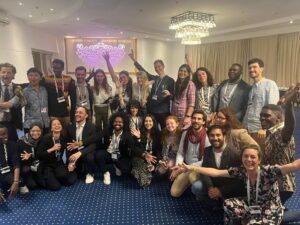
IFSA delegates – IFSA delegation at the GLF Climate
Authors: Volodymyr Kravets, Agustin Rosello, Aditi Mishra, Esha Mitra, Noor Mauliddina

